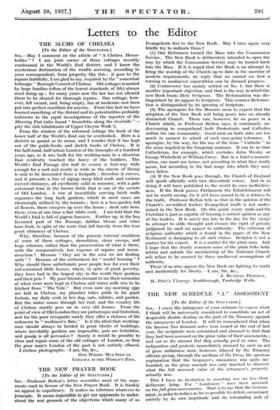Letters to the Editor
THE SLUMS OF CHELSEA
[To the Editor of the SPECTATOR.] SIR,—May I comment on the article of "A Chelsea House- holder " ? I am joint owner of three cottages recently condemned in the World's End district, and I know the mysterious destination of the wealth accruing, according to your correspondent, from property like this ; it goes to the repairs faithfully, I am glad to say, required by the "somewhat lethargic " Borough Council of Chelsea. Old cottages tenanted
by large families (often of the lowest standards of life) always need doing up ; for many years now the law has not allowed them to be cleared for thorough repairs. One cottage, how- ever, fell vacant, and, being empty, has at moderate cost been put into perfect condition for anyone. From this fact we have
learned something of the district and its potentialities probably unknown to the rapid investigations of the reporter of the Morning Post (who found " bronchitis along the riverside "- pity the rich inhabitants of Upper Cheyne Walk !).
From the window of the reformed cottage the back of the
lower half of the World's End can be overlooked. Here is a district as quaint as its name, and I wonder that it has kept out of the guide-books and sketch books of Chelsea. It is the half-rural, half-urban London of the boroughs of a hundred years ago, as it was built for the working-man in a situation that evidently touched the fancy of the builders. The World's End Passage (for half its course a foot-way wide enough for a cart and nearly as wide as the streets of Siena) is said to be descended from a footpath ; therefore it curves, and it presents a line of zigzag steep tiled roofs and curious curved chimneys, all excellently solid in masonry, with a pale autumnal tone in the brown brick that is one of the secrets of Old London. A row of beautifully curving brick walls separates the long back gardens, which in most cases are charmingly utilized by the tenants ; here is a box-garden full of flowers, there creepers up over the house ; sleek cats here, there, even at one time a fine white cock. I am told that the World's End is full of pigeon fanciers. Farther up, in the less favoured part of the Passage, dahlias bloom and vines bear fruit, in spite of the soots that fall heavily from the four great chimneys of Chelsea.
Why, therefore, because of the present internal condition
of some of these cottages, demolition, clean sweeps, and huge schemes, rather than the preservation of what is there, with the comparatively low expense of repairs and recon- struction ? Because " they are in the area we are dealing with " ? Because of the enthusiasm for " model housing " Why should these unfortunate poor people lose for ever their self-contained little houses, where, in spite of great poverty, they have had in the largest city in the world their gardens and their pets ? My poor friends recount to me their memories of when cows were kept in Chelsea and warm milk was to be fetched from " The Vale." But even now my morning eggs are laid in Chelsea, my plumber takes pride in his giant fuchsia, my daily cook in her dog, cats, rabbits, and garden. But the water comes through her roof, and the country life of Chelsea mostly goes on in very old houses. From the point of view of Old London they are picturesque and historical, and for the poor occupants surely they offer a richness of life unknown in " workmen's flats." Is it the ideal that working- men should always be herded in great blocks of buildings, where inevitably gardens are impossible, pets are forbidden, and gossip is all pervasive ? Surely it would be possible to clear and repair some of the old cottages of London, so that the poor man's London of the past is not entirely effaced.
I enclose photographs.—I am, Sir, &c.,
ONE WHOSE 'Bus STOP IN CHELSEA IS THE WORLD'S END.


































 Previous page
Previous page